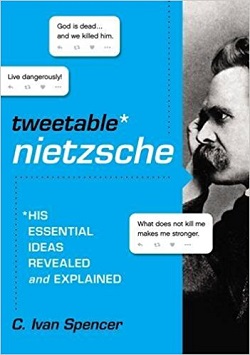Tweetable Nietzsche: His Essential Ideas Revealed and Explained. C. Ivan Spencer.
Zondervan, 2016. 174 pages.
A solid education equips students to educate themselves. However, eventually, the student encounters a new subject where he requires a guide into complexity. While trying to untangle the philosophical intricacies of Friedrich Nietzsche, Ivan Spencer has shown himself a teacher who has read the sprawling writings of a tortured intellect and mediates those complexities to his readers. Tweetable Nietzsche: His Essential Ideas Revealed and Explained offers little which a graduate student specializing in Nietzsche's thought would find unique. But for the undergraduate, the educated adult, or the teacher approaching Nietzsche for the first time, Spencer provides the most recent, accessible volume on Nietzsche’s thought. Throughout the book, Spencer’s method is clear: He provides a quote in the form of a tweet, and then explains it and its significance. In 174 pages, Spencer surveys several key ideas drawn from Nietzsche's writings, evaluates Nietzsche’s worldview against three objective measures, and leaves the reader valuing Nietzsche as an intellectually honest thinker - yet aware of the cost of affirming Nietzsche’s thought.
 Ivan Spencer is a professor of history and philosophy at the College at Southeastern, a Southern Baptist undergraduate institution, and the original designer of that college’s History of Ideas program. He brings to the study of Nietzsche several years’ experience teaching humanities courses to undergraduates. Because of his own history, his book is filled with literary, film, and cultural references to help elucidate complex thoughts.
Ivan Spencer is a professor of history and philosophy at the College at Southeastern, a Southern Baptist undergraduate institution, and the original designer of that college’s History of Ideas program. He brings to the study of Nietzsche several years’ experience teaching humanities courses to undergraduates. Because of his own history, his book is filled with literary, film, and cultural references to help elucidate complex thoughts.
Nietzsche is a seminal figure in the history of philosophy. His work occurred in the latter half of the nineteenth century, and his death in 1900. Spencer begins with Nietzsche’s most famous thought: “God is dead. God remains dead. And we have killed him.” From this foundation flow all of Nietzsche’s considerations. Convinced that God was nothing more than a social construct, Nietzsche argued that since the Western world had rejected the existence of God in the wake of Darwinian evolution, it must also courageously embrace the task of rejecting all morality, epistemology, and philosophy premised upon the existence of God. Spencer explains that “[t]o Nietzsche, belief in God, the central hub of Western civilization’s ideas and culture, thwarts progress.” Now that God was dead and that fact was recognizable in the brave new world of industrialized technology, true progress could begin.
Spencer explains that Nietzsche saw his work as revealing to the world its empty shibboleths: Nietzsche’s:
iconoclastic project hammer taps idols as with a tuning fork to see if they ring hollow. He listens as with a stethoscope to the idol’s interior. If hollow, he smashes it. ... Idols are the ideas, doctrines, and traditions that cultures have embraced for so long that they assume their truth even though they are lies.
However, Spencer makes clear that it is insufficient to declare Nietzsche a fatalistic nihilist. Nietzsche’s project was two-fold: to destroy lies, and to propose a new set of ideas in their place.
Nietzsche built a replacement worldview constructed out of “the threads of the overman, will to power, eternal return, amor fati, perspectivism, the transvaluation of values.” Spencer explains early on that Nietzsche despised systems, and systematizing his thought would not be a project Nietzsche favored. These concepts, however, build to a comprehensible Nietzschean worldview. The “overman” is the one who has rejected the outdated morality shaped by the Judeo-Christian heritage; such a one will ascend to a position where he lives “beyond good and evil.” Nietzsche sees the overman as the eventual evolutionary leap mankind will make, and he leaves open the possibility that individual overmen will arise along the way.
Humans are not to act in accordance with “good” or “evil,” because such concepts only exist in comparison with the non-existent God. Instead, people have will and must “will to power.” Nietzsche does not clearly explain this doctrine but implies that is the exercise of will by each individual to seek his own benefit. This egoistic principle forms the core of Nietzschean ethics.
Spencer begins with Nietzsche’s most famous thought: “God is dead. God remains dead. And we have killed him.” From this foundation flow all of Nietzsche’s considerations.
Nietzsche is a consistent materialist, rejecting both the existence of the soul and the afterlife. He posits instead the doctrine of the “eternal return,” in which the precise events of this life will be repeated in endless succession. This kind of reincarnation becomes a sort of “existential tool for living. In my life choices and events, maybe I should ask myself whether I would want this to recur. Do I live like I want to it to happen endlessly?” While this last doctrine seems to imply a strong view of free will, Nietzsche also expounded the amor fati, the love of one’s fate. Each person is completely determined by external forces and circumstances.
As for truth, Spencer explains Nietzsche as a forerunner to twentieth-century postmodernists. He argued for perspectivism, meaning that a truth-claim is nothing more than the perspective of the speaker. Without God’s existence, without anything existing transcendentally, truth is nothing more than a perspective to be compared with other perspectives. One must exercise his “will to power” and select the perspective that best suits him as an egoistic individual. Finally, Nietzsche contended for the “transvaluation of values.” The courageous individual is one who rejects the restraining morality of the past and embraces the stark truth of the death of God. Without God, virtues and vices are immaterial. What remains is the “will to power” and the quest to evolve towards the overman.
Spencer unpacks, explains, and illustrates each of the above concepts in comprehensible prose. Rather than directing the reader to dense passages of translated German, Spencer’s method involves finding le mot juste, or in this case, le tweet juste. He argues that Nietzsche is most comprehensible in his epigrammatic statements, which work perfectly for a generation already accustomed to the complex ideas communicated in 140 (now 280) characters. The format of Tweetable Nietzsche lends itself to easy teaching or discussion.
By the conclusion of the book, Spencer analyzes Nietzsche’s thought through three tests that, he argues, can be applied to any worldview: the tests of “coherence, correspondence, and practicality.” Spencer finds Nietzsche’s worldview wanting. His thoughts are filled with internal contradictions (failing coherence), his observations do not align with the way the world really is (failing correspondence), and when put into practice, Nietzsche's thought tends towards existential nihilism. Spencer commends Nietzsche for his intellectual courage and willingness to follow his thoughts to their logical conclusion.
We live in an increasingly post-Christian age, which wants the morality and charity of Christianity without the moral demands God’s existence places upon humanity. Tweetable Nietzsche calls the reader to consider his own convictions; in order to have human equality, ethical flourishing, and significant purpose, God must exist. Spencer leaves the reader where Moses left the Israelites millennia ago: “I set before you life and death. Choose life!”
Nietzsche sets before the atheist an example of consistency: Without God, there is no reason to embrace charity or morality. For the theist, Nietzsche presents a challenge in which the believer must articulate the necessity of God’s existence for human flourishing. For both groups, Nietzsche remains a significant thinker, and Ivan Spencer’s Tweetable Nietzsche provides an excellent introduction.
(Photo credit: Silvia Siles. This photo has been cropped and modified for size. CC BY-SA 2.0.)




